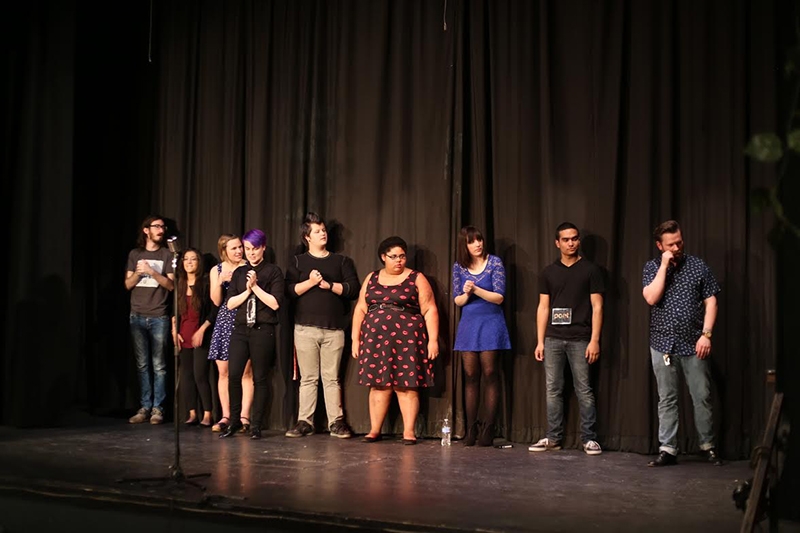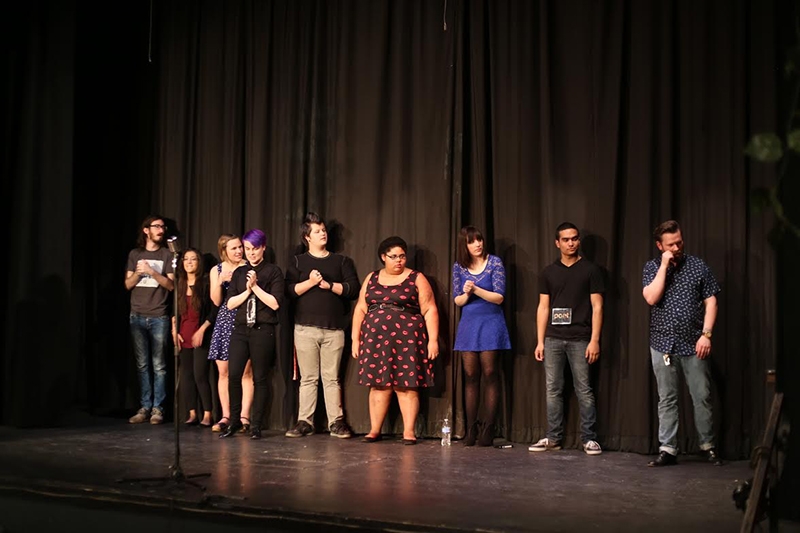Salt Lake Poetry Slam Finals: It’s Now or Never
Art

Sponsored by Wasatch Wordsmith, the 2015 Salt Lake Poetry Slam Finals took place at the Broadway theatre. This competition would determine which of the five poets from the 10 who qualified would represent Salt Lake at the national competition in Oakland, CA. The backstage mood was tense and nervous. Hannah Irene and Tenesha Nicole joined hands as they prayed silently while Ashley Finely rehearsed her poem in front of a full length mirror. The rest of the poets—sandwiched between a myriad of props—tried to talk loose and freely with rigid bodies.
The judges—who were randomly picked from the crowd minutes before the competition—all fulfilled the two requirements of not knowing any of the performers personally and never having attended a poetry slam before. “The criteria for judging is based on performance, originality and also what just speaks to them,” says Gray Thomas a performer and organizer with Wasatch Wordsmith. There were three rounds, two poets would be eliminated from the first, three from the second and the remaining five would go to nationals while one of the advancing group would win two tickets to the Salt Lake Acting Company’s performance of Mr. Right. The scores were on a zero to 10 scale written on whiteboards which were held up after each performance.
Featured guest poet Tim Toaster Henderson began the competition with a showcase of his work. Henderson’s poetry flowed through a mixture of his booming voice and awkward acting. His performance was a cohesive pairing between slam poetry and stand up comedy. Howls of laughter accompanied every poem due to his precise timing, word choice and delivery. The topics of his poems, however, took on a more serious note as they described life, social/racial issues, advice and living in a system which numbers its citizens. His final poem—which he stated “is really fucking weird”—entailed a man who would “poop scoop”—lifting another person’s breast with their fingers just to slap it down. This person poop scooped so proficiently that they scoop their way through prison and after being hit so many times had the agility of the best kung-fu monks. This man was stabbed later, in his chest, making his nipples excruciatingly sensitive, upon his hospital release, he asked for mercy but the offer of ironic vengeance was too sweet as Henderson moved his hand past the outstretched peace treaty and exacted “poop scoop” revenge.
Benjamin Barker was the first poet to start the competition. His poem, “The Ending Needs Work” summarized his efforts to re-write all the endings in his life. Through this process he found a new beginnings which created spaces for conversation. Following Barker, Ashley Finley took the stage with “Martyr.” Finley rapidly read her poem off a single sheet of paper. She equated her life and struggle to that of the national civil rights movement. Being a black woman she said that she did not want to be a statistic—that she just wanted to live in a country and have a life that should have already been hers. The standout poem from the first round was “House on Fire” by KarI Lindsey Berry, which stood out because Berry’s extra emphasis of emotion—her body moving in sync with the metre. She began to tear up when the poem moved into the realm of her friend and her wish to give her a burning house, where she would burn slowly for 40 years until they were nothing left but ashes and their soul coloring the sunset. Benjamin Barker and Ashley Finley were eliminated in the first round, while eight others advanced.
The second round began after a short 10 minute intermission and a performance by DeAnn Emett. Emett’s poem was passionate. From the beginning her confident yet soothing voice captured all attention. Her poem was about playing with Barbies and crossing gender identities. This came to a head when Emmett’s father caught her doing this, and from then on she realized that plastic was only a shell. Austin Payne recited a love poem to a blonde girl with a black streak in her hair. While he recited, his body swayed weightlessly with romantic notions. He wished that she never would leave but her love dams the river of his poetic ability. Tanesha Nicole’s poem was addressed as an open letter to her sister. Nicole rapidly sputtered words like a machine gun while she read off a page. Her body shrank behind the comfortable shield of the page, taking away from the raw emotion. Jose Soto’s poem “Memory of Word” stood out this round. His vivacious character came out as he talked about his Venezuelan identity in the United States. He made constant metaphors to the cold and snow then referred to an experience of having his face pushed in snow—which he later learned was called “whitewashing.” From here, he found himself in his brown paper lunch bag—cold lunches were never so warm. After the second round Tanesha Nicole, Austin Payne and Selina Foster were eliminated.
The final five were comprised of Gray, Kari Lindsey Berry, Rebecca Mae, Hannah Irene and Jose Soto. The last and final round of the Salt Lake Poetry Slam Finals determined which of the select five would win the ultimate prize—two tickets to Mr. Right. Rebecca Mae detailed the hard understanding of death of her father. She highlighted this with a watch her father had received from her mother. This watch kept all the important time of their family—only her father was the time-keeper. Once her father was diagnosed with only six months to live, she spun the watch backwards. She repeatedly turned back the hands on the watch to give him more time. In the end, none of it mattered—for now they are outside and its a beautiful day. Hannah Irene took the stage with a confident bravado. Their quick but purposeful speech hooked and reeled in attention. Irene’s poem spoke about finding themselves, understanding the actions of others and how it pertained to them. Gray’s poem “Pathological Liar” stole the show and won him the grand prize. In the poem, Gray talked about how his father always made small fibs. Lies that allow for a parent to be the central figure in their child’s life. Though, as Gray said, cancer never lies and after this disease made his father an honest man, he still didn’t believe him. When his father died and laid in his coffin, only then did Gray believe him.
The five finalists of the Salt Lake Poetry Slam Finals leave in August for Oakland, California. Since this is a public group, fundraising is necessary to help cover travel costs. Wasatch Wordsmith will be presenting slam poetry at the Utah Arts Festival for fundraising as wells as not-yet-finalized events at Weller Book Works. More information can be found at Wasatch Wordsmith’s Facebook account. Slam poetry events are held every last Monday 8 p.m. at Weller Books, every second Thursday 7 p.m. at Joffee’s Coffee and every Sunday at The GreenHouse Effect Coffee.

